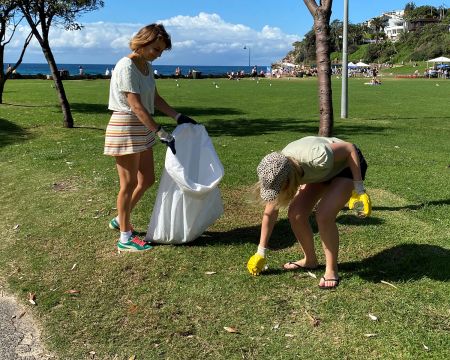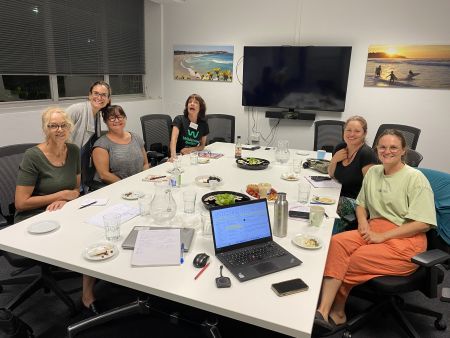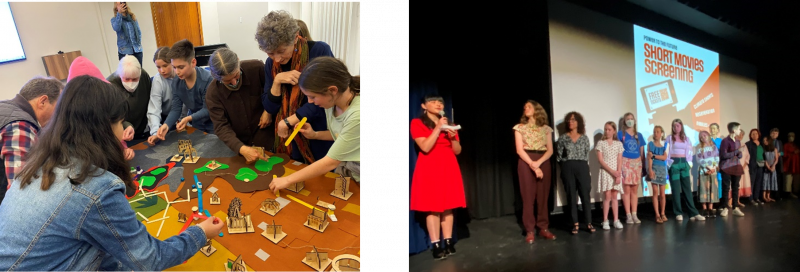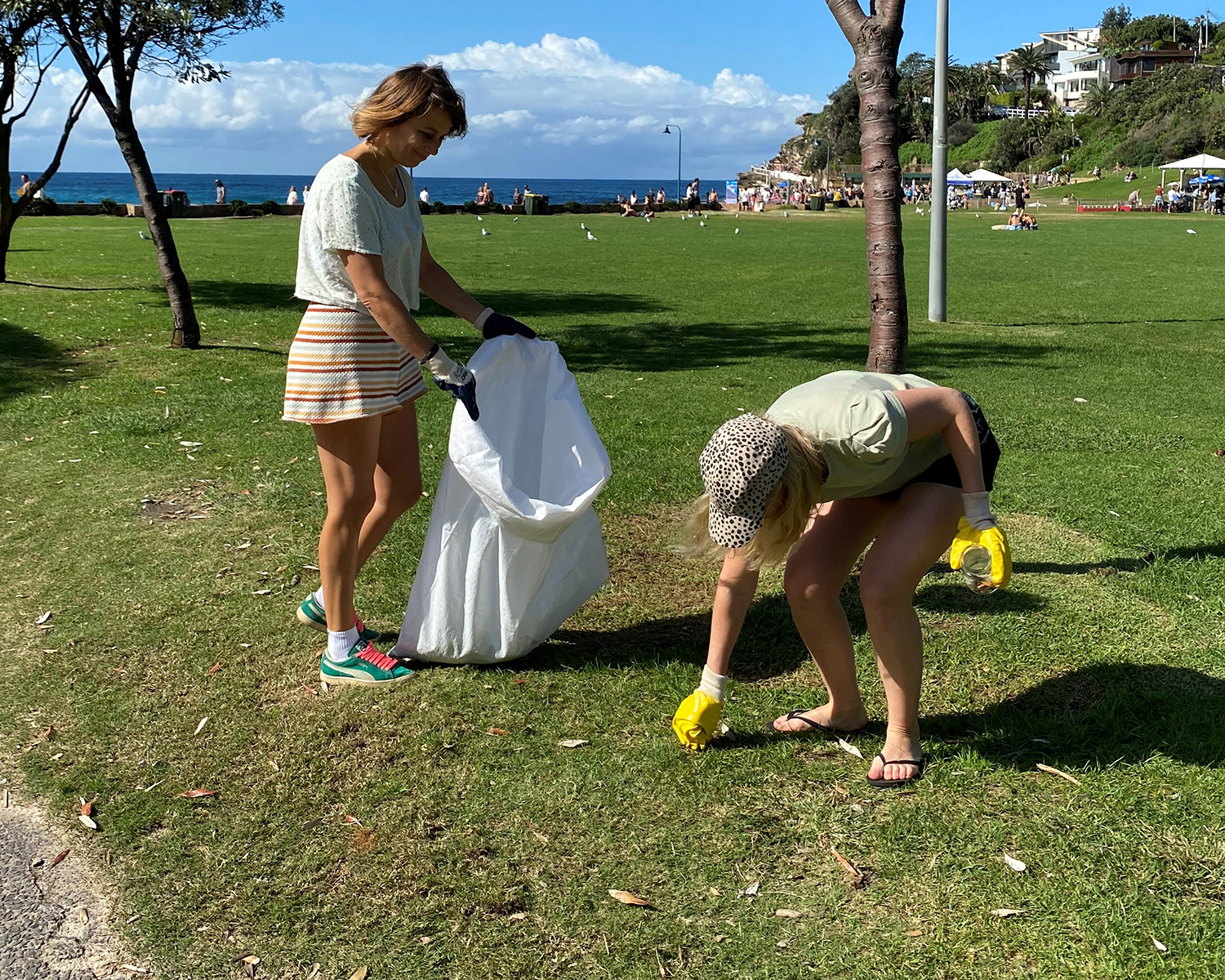‘You make a living by what you get. You make a life by what you give’ (Winston Churchill)
For the last 15 years, I have volunteered or worked with volunteering organisations. At Waverley, I am extremely lucky to closely work with various community groups; all passionate about protecting and caring for the environment. Every time we come together to share ideas and collaboratively make these happen, we feel elated and surrounded by a strong sense of connection and happiness: Together, we are helping our community and environment thrive and we feel good about it.
With busy lives, it can be hard to find time to volunteer. And while the tangible benefits of volunteering are well known, like helping people in need, meeting like-minded people, regenerating nature or sharing your skills and knowledge…. Did you know the benefits of volunteering can be even greater for the volunteer?

Volunteers at a beach clean-up in Bronte
Benefits of volunteering
Giving to others can help protect and improve your wellbeing. Research by various organisations has found a direct link between volunteering and wellbeing. It can help lower stress levels, stimulate your mind, fight depression, and give a sense of purpose. Volunteering helps create social capital which is key to help us bounce back from difficult times. It brings individuals together under a common cause thus creating a sense of connection and purpose. There is also a biological side to this. Studies and brain scans (MRIs) of volunteers have shown a positive link between volunteering and the release of dopamine and oxytocins, both chemicals that help lessen pain and make us feel good.
The last four years have been challenging in so many ways. Difficulties around the pandemic and the subsequent lockdowns, resulted in reduced opportunities to see and connect with friends and family, which has had ongoing impact on mental health*, and on our capacity and motivation to reach out or get involved. As a result, many local community groups and volunteer organisations are looking for new members right now. By joining an organised activity or group you can help out, and help yourself.

Volunteers planting trees at National Tree Planting Day
How do I become a volunteer?
One of the most important things to keep in mind to ensure volunteering is a success, is to make sure you enjoy what it is you’re doing and have fun whilst you’re doing it.
Here are some key steps along the path to a successful volunteering journey.
- Make a bit of room for your wellbeing: Described by Perlow as ‘Time famine’, this feeling of constant ‘busyness’ and ‘too much to do and too little time’ is exhausting and as a consequence, many of us end up doing things that fit in with our day-to-day activities rather than things with long term benefits. You can change this by training the muscles in your brain to ‘unlearn’ being busy. This should help open the door to the idea of volunteering.
- Find something you love: In a quiet space, reflect on what makes you tick. What makes you feel energised and happy? What do you enjoy and don’t enjoy doing? What would you like to contribute with or gain from volunteering?
- Find the right match: Jump on the net to research and connect with volunteering organisations you feel align with your needs. Volunteering with the right organisation can also help you learn new skills, connect with like-minded people, and find new friends.
- Keep it local: The closer it is to home, the more likely you will be to get involved and stay involved. In Waverley, there are a number of environmental, gardening and other volunteering groups that would appreciate your support and that you could connect with. You can also contact Waverley Council’s Coordinator Local Connections to learn more about the different volunteering options in Waverley and find one that is perfect for you.
- Chose ‘the one’: Meet-up with members of the volunteering organisation you would like to volunteer with to learn a bit more about what they do and discuss yours and their expectations (including time commitment). Some opportunities will be one off, or run for a few weeks or months, others might be ongoing. If it’s your first-time volunteering, choose an opportunity that is an easy fit for your lifestyle. You’re more likely to get more out of the experience when it doesn’t feel like a significant commitment of time or effort.
- Connecting my volunteering group with others: The more organisations working together the better the outcome. By combining forces – different skills, passions, viewpoints, networks, expertise and knowledge, volunteering organisations can make an even bigger positive impact for our local community and the environment. You can check Waverley Council’s Collaborating for Impact program to connect with other environmental organisations or contact Council’s Coordinator Local Connections to connect with other organisations.

Volunteers planning the Summerama festival
Council’s Power to the Future program will be seeking volunteer families in the new year to help develop and participate in a local program on climate change – so stay tuned for that and other opportunities to get involved with local environmental action. Or just reach out to the Environmental Team at Waverley on secondnature@waverley.nsw.gov.au to hear about what’s coming up.
With so many benefits and with so many great opportunities to get involved, there’s no better time than now to start, or resume, your volunteer journey.

Power to the Future participants creating an 'environmental city' and showing their movies at the Bondi Pavilion
If you already volunteer – or know or a Local Hero, consider nominating for Waverley’s Local Heroes awards coming up next month.
*Volunteering can assist in increasing and improving wellbeing. But is by no means the answer to a personal crisis. If you or someone you know is in crisis and needs help now, call triple zero (000). You can also call Lifeline on 13 11 14 — 24 hours a day, 7 days a week.


